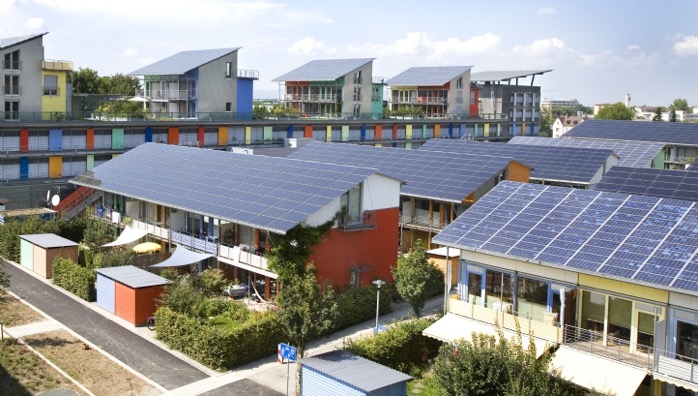
The Government’s efforts to scale-back on key green policies has been blocked, after the House of Lords voted to reintroduce on-site carbon compliance standards for homes and extend the grace period criteria for onshore wind farm subsidies.
The Treasury announced last summer it would be scrapping regulations on house building including a planned increase in on-site energy efficiency standards in order to streamline development.
The Government was defeated in a House of Lords vote on the zero-carbon homes amendment yesterday (26 April) as peers urged policy makers to back up the commitment made by the UK at COP21 in Paris and make higher carbon standards mandatory as soon as possible.
The new amendment of the Housing and Planning Bill – approved by 48 votes during the Lords Report Stage – called upon the Secretary of State to ensure “that all new homes in England built from 1 April 2018 achieve the carbon compliance standard”.
The reinstatement of the zero-carbon homes policy received cross-party support as peers commented on the potential of the amendment to contribute to meeting greenhouse gas (GHG) emissions targets and help lower fuel bills.
The House of Lords also passed an amendment to significantly widen the grace period criteria for onshore wind farms affected by early closure of the Renewables Obligation.
Under the extension, projects which require local support to operate – and were at advanced stages in production when the Government announced the early closure – will be protected.
‘Clear next step’
Commenting on the Government’s defeat, Julie Hirigoyen, CEO of the UK Green Building Council said: “During the ten years prior to July 2015, the leading players spanning the housebuilding industry – developers, product manufacturers, contractors and engineers – got behind zero-carbon homes, investing heavily and innovating to make it a reality.
“The unexpected and unwanted scrapping of the policy made a mockery of the Government’s green credentials, and demonstrated complete disdain for the quality of the nation’s new homes and the industry’s investment.
“Having supported the Paris climate agreement with much fanfare, cutting carbon from new homes and buildings will be vital to achieving our commitments. Re-introducing the zero carbon homes standard would be a clear next step on this journey, and would provide the certainty the industry needs to continue investing in new skills and technologies.”
‘Future misery’
The Treasury announced last summer it would be scrapping regulations on house building, including a planned increase in on-site energy efficiency standards in order to streamline development.
The Government’s decision to withdraw regulatory standards was criticised by housebuilders who gave evidence to the House of Lords Committee on National Policy on the Built Environment last October.
The committee concluded: “We disagree with the Government’s decision to remove the zero carbon homes policy and the Code for Sustainable Homes. These decisions are likely to add to long-term housing costs through a reduction in energy efficiency, and we have heard no clear evidence that they will lead to an increase in housebuilding”.
The Government has since suffered sustained attacks from green building leaders and sustainability professionals. At the start of the year, the Solar Trade Association warned that the Government urgently needed to replace the scrapped zero-carbon homes policy to avoid locking in higher carbon emissions and higher energy bills for occupants in future decades.
The National Policy for the Built Environment Committee echoed this sentiment less than a month later, arguing that the Government will create ‘future misery’ for homeowners if it doesn’t reverse its decision to scrap the zero-carbon homes requirement.
Source: edie newsroom








 We use Energy Report as our main Energy Performance Certificate provider. They are always very quick to act on an instructions and provide a very competitive quote. The report is turned around very swiftly and they are helpful and polite when answering queries. We have no hesitation at all in recommending Energy Report to any of our clients as they always provide excellent service.
We use Energy Report as our main Energy Performance Certificate provider. They are always very quick to act on an instructions and provide a very competitive quote. The report is turned around very swiftly and they are helpful and polite when answering queries. We have no hesitation at all in recommending Energy Report to any of our clients as they always provide excellent service.